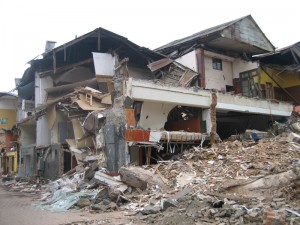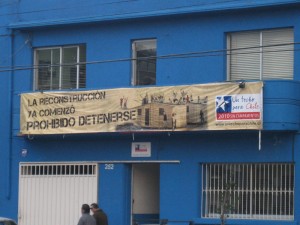By: César F. Rosado Marzán, PhD JD*
The earthquake that struck Chile on February 27 destroyed Maria’s home completely, leaving the young, single mother homeless. Fortunately, both Maria and her daughter survived the calamity. Unfortunately, they now had to figure out how to survive in their devastated city of Concepción. During the week immediately after the earthquake Concepcion’s economy collapsed and food and water were hard to find. Many in the city resorted to looting and rummaging through what was left in the destroyed stores to feed their children and themselves. At one point, Chile’s quasi-military police, the carabineros, reasoned that they could not stop the looting, so they simply gave orders for an “orderly” hunt: women with children first, young males last, and no taking of non-necessaries, such as LCD TVs.
Eventually, Maria found a place to shield her daughter and herself from the elements, a tent that the Red Cross and other charities built. However, the tent was not enough to protect Maria’s daughter form catching a pulmonary infection as a result of the cold and damp living conditions.
About ten days after the earthquake, when public transit was partially restored in Concepción, Maria ventured into the downtown to show up at the small clothing store where she worked. She found rubble everywhere on the street and sidewalk leading to the mall where the clothing store was located. A sign that read something on the lines of, “Enter at your own risk” stood in front of the mall. The mall owners would not make themselves responsible for any injuries suffered by anyone in the premises including employees, and requested that any and all entrants sign a form acknowledging their assumption of the risk.
Moreover, as she approached the mall, a carabinero questioned Maria on her motives for entering the mall and told her that she had no business being in there. Concepción was under a curfew as a result of the looting and carabineros and military personnel had swarmed the once bustling commercial city center to enforce it. Seeing the, “Enter at your own risk” sign and the wrecked conditions of the city, in addition to the harassing tone of the carabinero, Maria desisted from entering the mall and went back to her tent in the outskirts of the city to tend her sick child.
A few days later, about two weeks after the earthquake, Maria went back to the mall and found the city center in a bit better condition. However, when she got to the clothing store, her boss fired her for, allegedly, “job abandonment,” or for not showing up earlier to work. The boss told Maria that Maria abandoned her during the looting. “I had to put all my merchandise in my car, by myself, and drive it home to save it from looters. Perhaps I could not have opened the store [right after the earthquake], but at least Maria could have helped me save my merchandise and business, which provides Maria with a job to sustain her family.”
Maria was now not only homeless but also unemployed and with a sick child in a disaster zone.
In Chile, as in most other countries except the United States, employers can only terminate their employees for cause, meaning that employers must allege some kind of “just cause” – or “causal” in Chile– to justify the termination. However, even if workers are terminated for some justified cause, such as economic conditions of the employer, in many cases workers retain the right for severance pay equaling one-month pay for every year worked for the employer. In the case of Maria, who worked for the employer for six years, she had the legal right for six months of severance pay.
Nevertheless, in Chile the law provides some exceptions to the severance pay benefit, which includes if the termination was caused by the fault of the employee. Job abandonment would trigger one of such exceptions.
Of course, Maria did not show up to work because she decided to stay home and watch Oprah, or Oprah’s counterpart in Chile, but because she had lost her home, had no transportation to reach her job, the workplace seemed unsafe when she reached it, had no method to communicate with her employer and had a sick child to tend. Therefore, Maria filed a complaint of unjust termination at the Labor Directorate (or “DT”, its Spanish acronym), Chile’s labor law enforcement agency, to get her severance pay benefits.
This was not an isolated incident. Maria was one of thousands who filed, and who continue to file to this date, similar claims. Apparently, the earthquake conveniently gave many unscrupulous employers the opportunity to terminate employment contracts without paying severance pay.
About a month later, still homeless and unemployed, Maria’s hearing at the DT was finally held. The DT was performing the herculean task of providing workplace justice amidst the worst calamity suffered in Chile in recent history. In Concepción, the DT used to have three separate offices but the earthquake destroyed two of the three, so its civil servants had one-third the space to service citizen needs. The office was jam-packed with complaining, angry and stressed workers and civil servants. Some workers had to be attended under large tents. The DT was also backlogged two weeks because the city was not operational for about the same period of time. Cases of alleged unlawful terminations were piling up.
Given the sharp increase of employment terminations after the earthquake, the Chilean government reminded employers that they could not use the earthquake as prima facie justification for terminations. The DT, following orders from the President of the country, Sebastián Piñera, made this plainly clear on March 19 when it promulgated a “dictamen” –or what we would consider an administrative rule in the U.S. — providing a very limited interpretation of the causales of “fuerza mayor” or “caso fortuito” (force majeure or unforseeability, in the common law) for employee terminations without severance pay. The dictamen was widely discussed in the press and became a topic of national discussion especially when large retailers, who were still generally operational after the earthquake, massively terminated employees after the earthquake, bogusly alleging fuerza major or caso fortuito.
Such narrow interpretation of the causales was issued by a new, conservative government, which took the reins of power just weeks after the earthquake. The protective dictamen likely came as a surprise to some Chilean leftist political elites who predicted that the right-wing government would come, hatchet in hand, to cut workers’ rights and rebuild the capitalist paradise that was Chile during the 1973-1989 period when a neoliberal dictatorship ruled the country.
But democracy is an interesting and resilient institution when seriously installed. The new right wing government, the first of its kind to be democratically elected in more than half a century in Chile, knew that it needed to win the heart and minds of the country’s workers if it was going to be reelected in 2013 or even remain relevant in the otherwise liberal democratic country. Only two decades earlier, the Chilean capitalist class could easily count on the Pinochet dictatorship to decree conservative economic policies as it pleased, no matter at what human and social cost to the working class, but now it had to play under the rules of democratic governance. The times when technocratic elites could apply “shock therapy” on the working class during times of crisis without a popular, democratic response – or with military governments to quell such popular responses with violence – seems to be over in Chile.
Not that the current government does not plan to put in place conservative economic and social policies. It is planning to do so. At the time, the government attempts to sell publicly owned enterprises to, at least allegedly, finance the reconstruction efforts of the country. Altering more fundamental property rights seems to be in the front burner, not curtailing labor rights. There is some public buzz for a mild change in the labor laws, which would include shortening severance pay rights and, in return, increasing unemployment benefits for Chilean workers. Given the preliminary discussion regarding these labor law reforms, it is still too early to know whether such a reform would mean more or less money for jobless workers. But once the details of the reforms are better known the political opposition, including labor, will be ready to launch its defense.
Back in Concepción, and after a labor inspector instructed the parties of their rights and obligations under the law, Maria and her employer informally resolved their dispute. They were going to part ways but not after the employer agreed to provide Maria with severance pay benefits and a “finiquito” – or neutral termination of employment letter needed by Maria’s to start her new job at a supermarket.
Maria and her daughter were far from reestablishing a normal life. For starters, they still lived under a tent, with minimal protection from the elements and with almost no sense of privacy. But with money to buy food and other necessities, and a new job, the small family could better sustain the blows inflicted on it as a result of the earthquake. Maria couldn’t simply be forced to accept the worst of miseries and be shocked into submission, as workers in previous decades were forced in Chile. For consolation, Maria had much more than just the empty promises of a brighter future preached by market fundamentalists of decades past. She had labor rights backed by a democratic state.
*Assistant Professor of Law, Chicago-Kent College of Law. Professor Rosado is currently performing field research in Chile for an ethnographic, socio-legal study on labor law enforcement.





Leave a Reply